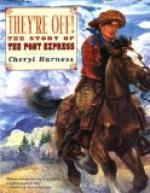The schedule was at first fixed at ten days for eight months of the year and twelve days during the winter season, but this was soon lowered to eight and ten days respectively. An average speed of ten miles an hour including stops had to be maintained on the summer schedule. In the winter the run was sustained at eight miles an hour; deep snows made the latter performance the more difficult of the two.
The best record made by the Pony Express was in getting President Lincoln’s inaugural speech across the continent in March, 1861. This address, outlining as it did the attitude of the new Chief Executive toward the pending conflict, was anticipated with the deepest anxiety by the people on the Pacific Coast. Evidently inspired by the urgency of the situation, the Company determined to surpass all performances. Horses were led out, in many cases, two or three miles from the stations, in order to meet the incoming riders and to secure the supreme limit of speed and endurance on this momentous trip. The document was carried through from St. Joseph to Sacramento — 1966 miles — in just seven days and seventeen hours, an average speed of ten and six-tenths miles an hour. And this by flesh and blood, pounding the dirt over the plains, mountains, and deserts! The best individual performance on this great run was by “Pony Bob” Haslam who galloped the one hundred and twenty miles from Smith’s Creek to Fort Churchill in eight hours and ten minutes, an average of fourteen and seven-tenths miles per hour. On this record-breaking trip the message was carried the six hundred and seventy-five miles between St. Joseph and Denver[13] in sixty-nine hours; the last ten miles of this leg of the journey being ridden in thirty-one minutes. Today, but few overland express trains, hauled by giant locomotives over heavy steel rails on a rock-ballasted roadbed average more than thirty miles per hour between the Missouri and the Pacific Coast.
The news of the election of Lincoln in November 1860, and President Buchanan’s last message a month later were carried through in eight days.
Late in the winter and early in the spring of 1861, just prior to the beginning of the war, many good records were made with urgent Government dispatches. News of the firing upon Fort Sumter was taken through in eight days and fourteen hours. From then on, while the Pony Express service continued, the business men and public officials of California began giving prize money to the Company, to be awarded those riders who made the best time carrying war news. On one occasion they raised a purse of three hundred dollars for the star rider when a pouch containing a number of Chicago papers full of information from the South arrived at Sacramento a day ahead of schedule.




